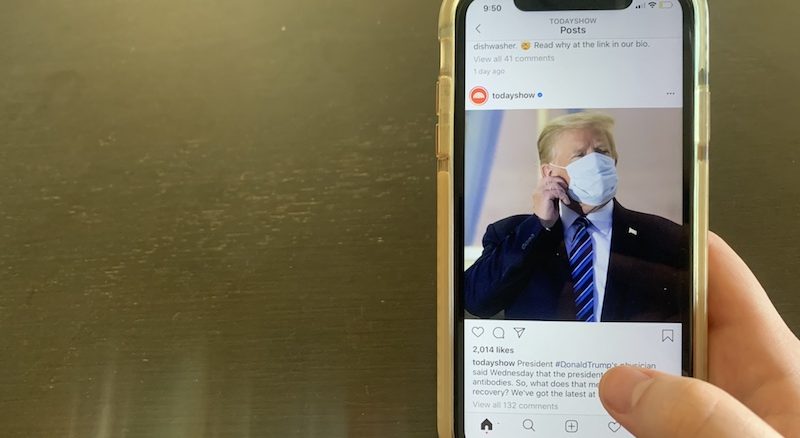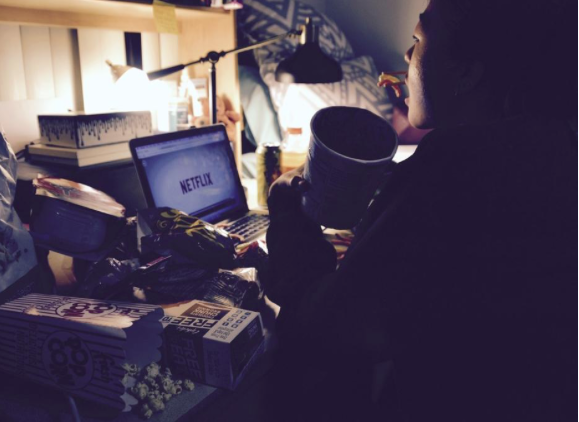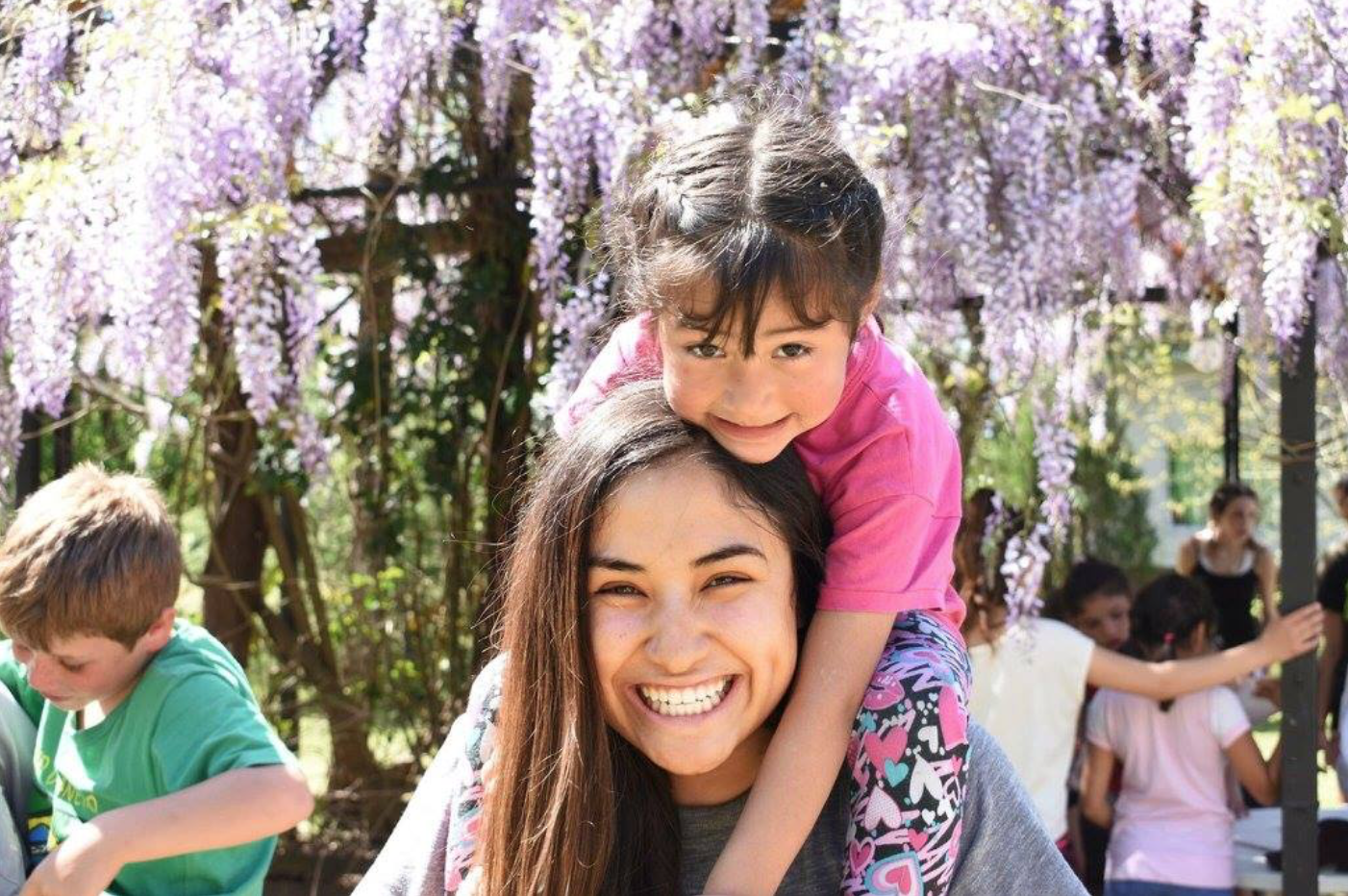
Social media has become more political in the last four years, and many first-time voters are turning to their feeds to educate themselves about the upcoming election.
The evolution of technology has impacted every aspect of people’s lives, and the 2020 election is no exception.
Whether it is Instagram, Twitter, Snapchat or TikTok, more college students are turning to social media to educate themselves about the current political environment as many of them get ready to vote for the first time.
“It’s wrong to deny the influence that social media is having right now in American politics,” said Robert Williams, divisional dean of the Social Science Division at Pepperdine. “It is having a significant influence.”
Social media dominates today’s political and media landscape and has changed the way Americans get and view the news. Everyone with a social media platform has a voice and an audience, and misinformation can be spread with a click of a button. First-time voters are feeling the effects of the political divide as well as the stress of wondering where to get credible news because of the influence of social media.
Rise and dominance of social media
MySpace, the first social media site, began in 2004, according to Our World in Data. After MySpace, social media progressively evolved, and now, one-in-three people in the world use it. Facebook is the leading social media site, with approximately 2.4 billion users.
Statistically speaking, social media dominates the lives of people, especially teens, all over the world. Some 90% of millennials are on social media, and nearly 78% of Generation Z, according to Our World in Data.
“Social media has the ability to quickly, easily, inexpensively share information about anything,” said Political Science Professor Chris Soper.
“The Social Dilemma” on Netflix shows how dangerous social media is to teens and the significant effect it has on their brains. In the documentary, experts talk about how social media is affecting the mental health of users and how users are targeted with specific posts on their feeds.
“The platforms make it possible to spread manipulative narratives with phenomenal ease, and without very much money,” Renee McNamee, early investor venture capitalist in Facebook, said in the documentary.
How social media can influence politics
Social media has allowed people to use their voice for the issues that matter to them and allowed groups protesting for a specific political cause to connect with each other.
In June, Black Lives Matter chapters used social media to organize protests following the death of George Floyd. The movement actually began in 2013, when the hashtag #BlackLivesMatter went viral after the death of African-American teen Trayvon Martin.
The hashtag quickly spread throughout the world on social media and is still being used today. The hashtag has been used 11.8 billion times on Twitter, according to Pew Research.
“I don’t think that [the protests] would have been possible without the capacity to very quickly mobilize people through the various mediums of Facebook, Twitter, etc.,” Soper said.
Social media has also helped promote political opinions. With the click of a button, any social media user can quickly share their opinion.
“You don’t have to have a job at CNN or MSNBC to make your voice heard,” said Spencer Lindquist, junior political science major and president of Pepperdine College Republicans. “If people like what you have to say, then you can have an audience of thousands.”
Social media is being used as a political outlet all around the country, and students are seeing more political posts than ever before.
A Pepp Post poll of 60 college students throughout the country found that nearly 97% of students said they see political posts on their social media feeds frequently.
The Pepp Post poll also revealed that roughly 54% of students do not share political posts on their feeds, leaving 46% of students saying they sometimes or usually do.
“The kind of activism that social media encourages is thin activism. … It is really easy to like a tweet, but it’s meaning is not clear,” Soper said. “It’s not the same kind of level of political engagement.”
The poll also revealed that only around 9% of students do not read the posts their friends share. The impact of these political posts on social media is powerful and can reach a large audience.
College students have said that they do learn from the posts their friends share. Junior psychology major Claire Mullin said she has become more aware of social issues going on in the country because of the posts she has seen from her peers on social media.
“That plays a huge part in how I vote the way that I do,” Mullin said.
How misinformation spreads on social media
Information spreads fast on social media, and it is not always accurate. When discussing politics, this can be dangerous.
“The amount of stuff that is absolutely false or out there as clickbait tells us that this is a real problem,” Williams said.
With so many posts constantly on social media, it is important for young voters, especially college students, to make sure that what they are engaging with and posting is accurate, Soper said.
In addition, many people are trying to influence their followers to believe their same political views.
“People on social media have a certain agenda or a certain narrative they want to push,” Mullin said.
Social media companies have hired fact-checkers, whose sole job is to check the information being spread on each social media site, Merrill Fabry wrote in an Oct. 24 Time article. But even with those fact-checkers, misinformation is still spreading rapidly across all sites.
That is one of the main reasons why there is bias and division in social media, Peter Suclue wrote in an Oct. 30 Forbes article.
“I think [social media] is an extremely useful tool in getting out information about voting and registration, but the disinformation, lies and inciting of violence might outweigh that,” said Reagan Phillips, freshman political science major.
Roughly 49% of college students in the poll agreed, saying that they don’t think social media is a good place to get accurate news.
“We need to tell people that there is good information out there, but it might not be where you are looking,” Williams said.
The Pepp Post poll found that many college students only get their news from social media, which means the information they are seeing could be completely inaccurate.
“If people are actually motivated to look at news — actively look at news instead of passively consuming it through social media — then they will go to reputable websites,” said Terra Hernandez, freshman political science major.
How social media is fueling the political divide
In addition, social media has had an effect on the controversial political divide in the United States right now, Evan MacDonald wrote in an Aug. 30 Cleveland article. There is a far left and a far right, both posting their beliefs every day. Williams said social media consumers, especially college students, will follow whatever accounts align with their beliefs.
“We will tend to follow those news sources that make us feel good and feel good about our candidate,” Williams said.
The divide over politics on social media is ruining some friendships and family relationships, Ashley Fetters wrote in a March 21 The Atlantic article. If one person posts something political that another person does not agree with, they could completely lose their relationship. Instead of helpful, engaging conversation about political topics, there is hurtful speech on social media.
“I feel like there isn’t any common ground of conversations being made,” said Ronald Wicks, freshman political science major.
Wicks also said younger people are getting news from social media that is slanted one way or another. The Pepp Post poll surveying college students showed that approximately 50% of students said the posts they see are from just one political party.
One assumption as to why the political divide has been highlighted more on social media is because people, especially college students, are more comfortable sharing their opinions behind a screen than they would be face to face.
“It has highlighted the divide because people are so polarized and are more comfortable sharing that on social media,” Mullin said.
Better ways for college students to educate themselves about politics
Williams encouraged students to be critical thinkers and educate themselves about what is going on.
“We all have the opportunity and the responsibility to think in a liberal arts setting about critical thinking,” Williams said. “What four years of college is supposed to do is to make us better at assessing the information that comes across our screens so that we are good critical thinkers.”
There are several ways college students can educate themselves about politics, such as reading or watching news from news networks, instead of passively consuming news through social media.
“Talking with friends, having conversations, political conversations in classes are good ways to be engaged,” Williams said.
Social media can be hard for college students to navigate, sift through and determine between true and false, and when it comes to politics, it can be even harder, Williams said. With the upcoming election, college students need to be more aware than ever about the credibility of the information they see on their social media feeds.
Abby Wilt completed the reporting for this story under the supervision of Dr. Christina Littlefield and Dr. Elizabeth Smith Jour 241 in Fall 2020. Dr. Littlefield supervised the web story.



